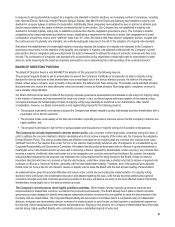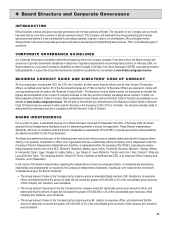Kodak 2007 Annual Report Download - page 132
Download and view the complete annual report
Please find page 132 of the 2007 Kodak annual report below. You can navigate through the pages in the report by either clicking on the pages listed below, or by using the keyword search tool below to find specific information within the annual report. 9
In response to strong shareholder support for a majority vote standard in director elections, an increasing number of companies, including
Intel, General Electric, Motorola, Hewlett-Packard, Morgan Stanley, Wal-Mart, Home Depot and Safeway have adopted a majority vote
standard in company bylaws or articles of incorporation. Additionally, these companies have adopted by laws or policies to address post-
election issues related to the status of director nominees that fail to win election. Our Company has not established a majority vote
standard in Company bylaws, opting only to establish a post-election director resignation governance policy. The Company’s director
resignation policy simply addresses post-election issues, establishing a requirement for directors to tender their resignations for board
consideration should they receive more “withhold” votes than “for” votes. We believe that these director resignation policies, coupled with
the continued use of a plurality vote standard, are a wholly inadequate response to the call for the adoption of a majority vote standard.
We believe the establishment of a meaningful majority vote policy requires the adoption of a majority vote standard in the Company’s
governance documents, not the retention of the plurality vote standard. A majority vote standard combined with the Company’s current
post-election director resignation policy would provide the board a framework to address the status of a director nominee who fails to be
elected. The combination of a majority vote standard with a post-election policy establishes a meaningful right for shareholders to elect
directors, while reserving for the board an important post-election role in determining the continued status of an unelected director.”
BOARD OF DIRECTORS’ POSITION
The Board of Directors favors a vote AGAINST the adoption of this proposal for the following reasons:
This proposal requests Kodak to ask its shareholders to amend the Company’s Certificate of Incorporation to adopt a majority voting
standard for director elections so that shareholders have a meaningful role in the director election process. As noted in the proposal,
Kodak, a New Jersey company, uses a plurality voting standard, the default under New Jersey law. The plurality voting standard provides
that nominees who receive the most affirmative votes are elected to serve as Kodak directors. Most large public companies continue to
use a plurality voting standard.
Our Board of Directors has been mindful of the ongoing corporate governance developments and debates on the subject of majority voting
in the election of directors and has examined this issue very closely. In fact, our Board agrees with many aspects of the majority voting
concept and believes the fundamental principles of majority voting may potentially be beneficial to our shareholders. After careful
consideration, however, our Board recommends a vote against this proposal for the following reasons:
• The proposal is presently unnecessary because the Company has already adopted a policy that already provides shareholders with a
meaningful role in director elections;
• The proposal is also unnecessary at this time since Kodak’s corporate governance practices ensure that the Company’s directors are
highly qualified; and
• The proposal is premature in light of the on-going analyses and discussions on majority voting and its possible consequences.
The Company has already implemented a director election policy. Like a number of other large public companies facing this issue, in
order to address the concerns relating to director candidates who do not receive a majority of the votes cast, the Company has adopted a
Director Election Policy. This policy provides direct and effective consequences by requiring that any nominee who receives more votes
"withheld'' from his or her election than votes "for'' his or her election must promptly tender an offer of resignation for consideration by our
Corporate Responsibility and Governance Committee. We believe that this policy at the present time is effective in giving shareholders a
meaningful voice in the director election process and in removing a director opposed by shareholders. Under our policy, any nominee who
receives a majority of withhold votes must tender his or her resignation and could be removed from the Board. By contrast, the majority
voting standard requested by the proposal only addresses the voting requirement for being elected to the Board. It does not remove
incumbent directors who have not received a majority vote because, under New Jersey law, a director who fails to receive a required vote
continues in office as a "holdover'' director, generally until the next shareholder meeting. Therefore, even if the proposal were adopted,
Kodak could not force a director who failed to receive a majority vote to leave the Board until the next annual meeting of shareholders.
As explained below, given the practical difficulties and issues under current law surrounding the implementation of a majority voting
standard, there continues to be considerable discussion and debate regarding this topic. Until the law becomes settled and a general
consensus emerges as to best corporate governance practice in this area, we believe our policy is the most effective means of providing
shareholders a meaningful role in the director election process.
The Company’s current process elects highly qualified candidates. Given Kodak’s strong corporate governance practices and
responsiveness to shareholder concerns, we believe the proposal is unnecessary. The Board already has in place a robust corporate
governance process designed to identify and propose independent director nominees who are qualified to serve the best interests of the
Company and our shareholders. The Corporate Responsibility and Governance Committee, which is composed solely of independent
directors, evaluates and recommends director nominees for election based on such factors as their business or professional experience,
the diversity of their background and their talents and perspectives. Relying on this process, the Company’s shareholders have historically
elected strong, highly qualified Boards, who consistently receive a substantial majority of votes cast.
























